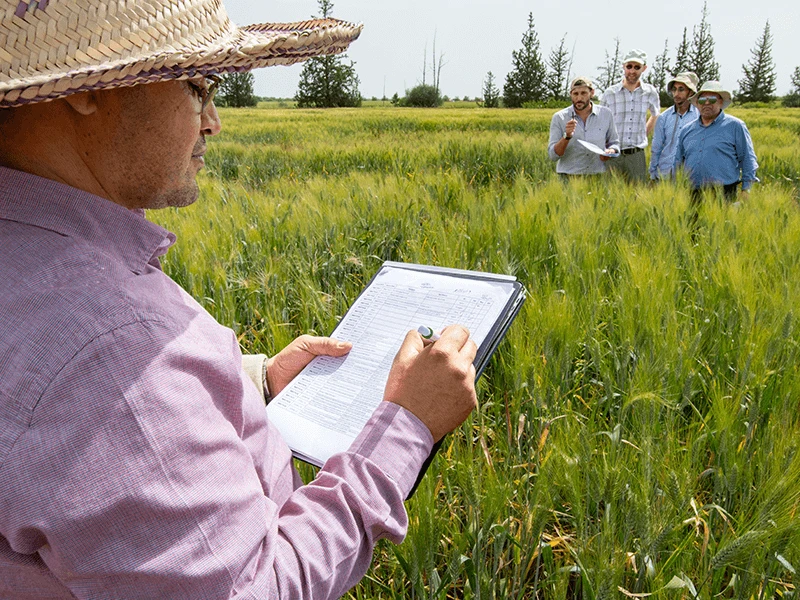Agroecology supporters mull threats and opportunities posed by agro-biotechnology revolution
Agroecology supporters mull threats and opportunities posed by agro-biotechnology revolution


The result of 18 months of workshops and analysis, the Agroecological Intelligence project brought together agroecological farmers and growers for a series of in-depth discussions about the role of technology in their farming systems and the main factors at play when making their decisions.
Agroecology – rooted in cyclical systems, functional biodiversity, resilience and ecological efficiency; and built on values of justice, equity, knowledge sharing and community-based governance – has traditionally been seen as low-tech with no or limited external inputs. As such, the values on which it is based are distant and disconnected from those of Agriculture 4.0.
…
We… began with a couple of assumptions. One was that choices around technology are not values- neutral. The other is that while the agroecological ‘umbrella’, made up of these different approaches, provides a narrative canopy made up of language and concepts – such as natural, holistic, food sovereignty, social justice, equity, health, small- scale, co-creation and indigenous knowledge – strict allegiance to these concepts likely varies between the different strands, which might make consensus over technology criteria, choices and implementation difficult.
…
We wished to understand what UK agroecological farmers and growers wanted and needed from technology developers and from the government
We did not find definitive answers to all these things. Nor was it possible to answer with any certainty whether agritech was a transition pathway or a ‘Trojan horse’. What we did find was an eloquent antidote to the agritech hard-sell based on deeply held values and an interest in technology that serves those values, but little to no interest in technology that does not.
The farmers and growers we spoke to emphasised the importance of a more critical and context-specific approach to technological innovation, one that involved creating and evaluating technology based on its compatibility with agroecological principles and practices.
[Editor’s note: Download the final report here: Final Report]
This is an excerpt. Read the original post here

 | Videos | More... |

Video: Nuclear energy will destroy us? Global warming is an existential threat? Chemicals are massacring bees? Donate to the Green Industrial Complex!
 | Bees & Pollinators | More... |

GLP podcast: Science journalism is a mess. Here’s how to fix it

Mosquito massacre: Can we safely tackle malaria with a CRISPR gene drive?

Are we facing an ‘Insect Apocalypse’ caused by ‘intensive, industrial’ farming and agricultural chemicals? The media say yes; Science says ‘no’
 | Infographics | More... |

Infographic: Global regulatory and health research agencies on whether glyphosate causes cancer
 | GMO FAQs | More... |

Why is there controversy over GMO foods but not GMO drugs?

How are GMOs labeled around the world?

How does genetic engineering differ from conventional breeding?
 | GLP Profiles | More... |

Alex Jones: Right-wing conspiracy theorist stokes fear of GMOs, pesticides to sell ‘health supplements’




 Viewpoint — Fact checking MAHA mythmakers: How wellness influencers and RFK, Jr. undermine American science and health
Viewpoint — Fact checking MAHA mythmakers: How wellness influencers and RFK, Jr. undermine American science and health Viewpoint: Video — Big Solar is gobbling up productive agricultural land and hurting farmers yet providing little energy or sustainabilty gains
Viewpoint: Video — Big Solar is gobbling up productive agricultural land and hurting farmers yet providing little energy or sustainabilty gains Fighting deforestation with CO2: Biotechnology breakthrough creates sustainable palm oil alternative for cosmetics
Fighting deforestation with CO2: Biotechnology breakthrough creates sustainable palm oil alternative for cosmetics Trust issues: What happens when therapists use ChatGPT?
Trust issues: What happens when therapists use ChatGPT? 30-year-old tomato line shows genetic resistance to devastating virus
30-year-old tomato line shows genetic resistance to devastating virus California, Washington, Oregon forge immunization alliance to safeguard vaccine access against federal undermining
California, Washington, Oregon forge immunization alliance to safeguard vaccine access against federal undermining The free-range chicken dilemma: Better for birds, but with substantial costs
The free-range chicken dilemma: Better for birds, but with substantial costs ‘You have to treat the brain first’: Rethinking chronic pain with Sanjay Gupta
‘You have to treat the brain first’: Rethinking chronic pain with Sanjay Gupta
